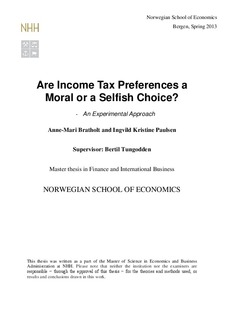| dc.description.abstract | An understanding of personal preferences and attitudes is crucial in order to design an
income tax system that people find fair. We have examined, by means of an economic
experiment, how selfishness, risk preferences and concerns for the equality/efficiency tradeoff
relate to preferences for progressive taxation. Our results indicate that there is no direct
link between selfishness and tax preferences. Nevertheless, the degree of selfishness seems
to affect the relationship between the other variables. For people who are not very selfish,
both risk aversion and a concern for efficiency correspond with a positive attitude towards
progressive taxation. As the degree of selfishness increases, risk preferences and concerns
for equality and efficiency become less important. At high levels of selfishness, neither
selfishness, risk preferences nor concerns for equality and efficiency seem to explain
preferences for progressive taxation. In conclusion, income tax preferences are based on both
moral and selfish concerns. | no_NO |
